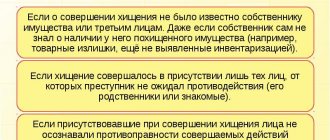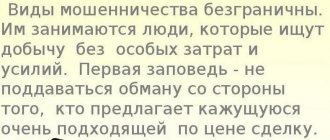Multi-channel free hotline Legal advice on criminal law. Every day from 9.00 to 21.00
Moscow and region: +7 (495) 662-44-36
St. Petersburg: +7 (812) 449-43-40
Types of fraud on the Internet
Fraud has one feature that makes it difficult to investigate - in most cases, the victim, of his own free will, provides information to the criminals that leads to the loss of his money. Types of fraudulent activities in cyberspace:
- Online stores. A huge number of stores offer low prices on goods. This attracts people, they pay money for a virtually selected product. After the money arrives in the seller’s account, it disappears, leaving the buyer without money and goods. The second type of deception in an online store: instead of the declared item, a bad copy is sent by mail, cheaper and of worse quality.
- Creating copies of bank websites. The scammer who created this site invites the user by email or SMS to log in to it. When a user lands on a fake website, he logs into his personal account, revealing logins and passwords to access his accounts. Using this data, the fraudster empties the bank account.
- Hacking electronic wallets. This type of receiving and storing money has become popular in recent years. The fraudster can send a message about the operator’s loss of credentials with a request to send them again. After receiving this data, he will empty the wallet.
- Emails. A letter arrives in the mail with a message about the won valuable prize. To receive it, the winner must transfer a certain amount to the account specified in the letter.
- SMS message from the bank about account blocking. After this message they ask you to transfer money to unblock it.
- Fake airline websites. Prices that are too low, a request to transfer money to an electronic wallet, or a foreign bank account are points that should alert the buyer.
- Imaginary charitable purposes. A story appears online about a child who needs urgent surgery abroad. This is where the money is collected.
- Distant work. Some unscrupulous employers offer work from home with advance payment for organizational needs. Even after completing the proposed work, the contractor will not receive money for it and will waste his money and time.
The understanding that the possibilities of the Internet are limitless does not add to optimism. This means that scammers will come up with new schemes to deceive people.
In-game currency is a scam
What would you think if we offered you the opportunity to exchange your money for coins from your nearest supermarket in order to make purchases there? You can only use these coins, and you can only buy them in sets: $99, $199 and $499 for 349, 749 and 1969 supermarket coins. At the same time, all prices in the supermarket are indicated in coins and you will not find information about how many coins a kilogram of meat or a liter of milk costs. Moreover, you cannot simply exchange the remaining coins back into dollars or rubles.
Sounds like complete nonsense? Would you go to such a supermarket? However, for some reason, game developers and publishers allow themselves to engage in precisely this practice, offering you “wonderful” in-game coins, dollars, and gold.
Many modern games come with in-game purchases. In many of these games, the gamer is required to exchange real money for in-game currency in order to buy things, boosts, lives, skins and the like. And no matter how developers and publishers explain their actions, this practice borders on fraud, as it is deliberately problematic and confusing for gamers. The purpose of these models is to deliberately hide the real price of in-game items, without providing a clear explanation of how much a person actually pays. If such practices existed in real stores, then most of us simply would not go to such stores. However, in the gaming industry this has become inevitable.
There is nothing wrong with monetization as such - it is an understandable desire of any business to make money. However, what's causing the rage about in-game currency is the purpose of using a complex scheme to squeeze as much money out of the player as possible because they don't understand how much something is worth in real money. After all, buying 5 lives for 50 crystals does not sound as serious as the same 5 lives for $5.
An example is the game ingress, where a player can purchase the following sets of currencies:
| CMU coins | $ |
| 7000 | 4,99 |
| 15000 | 9,99 |
| 32000 | 19,99 |
| 90000 | 49,99 |
| 200000 | 99,99 |
Now let's take a look at the price of the things themselves in the game ingress:
| In-game items | CMU coins |
| Portal Breacher | 2400 |
| Set of 5 punches | 9600 |
| Set of 10 punches | 14900 |
| Box key | 3700 |
| Set of 5 box keys | 14900 |
| Lighthouse | 1300 |
This model is confusing on several counts:
- It forces the user to calculate the cost per unit of in-game currency
- It forces the user to calculate the real price for an item or set
- Users must calculate various combinations to find the real price
- If a child plays, he hardly realizes that Candy Crush is a very expensive game; and you yourself won’t understand the cost of a piercer just by looking at the tables above
- All prices are broken down in such a way that you will always have in-game coins that you cannot exchange for real money
What should the currency exchange table look like in the game:
| CMU coins | $ | $ for 1000 coins |
| 7000 | 4,99 | 0,71 |
| 15000 | 9,99 | 0,67 |
| 32000 | 19,99 | 0,62 |
| 90000 | 49,99 | 0,56 |
| 200000 | 99,99 | 0,50 |
In this case, the price of individual items should also be presented as follows:
| Thing | C.M.U. | $0.71/1k CMU | 0.67/k CMU | 0.62/1k CMU | 0.56/1k CMU |
| Puncher | 2400 | 1,70 | 1,61 | 1,49 | 1,34 |
| 5 punchers (for 1 in $) | 9600 | 6,81 (1,36) | 6,43 (1,29) | 5,95 (1,19) | 5,38 (1,08) |
| 10 punchers (for 1 in $) | 14900 | 10,58 (1,06) | 9,98 (1,00) | 9,24 (0,92) | 8,34 (0,83) |
Naturally, no one does such calculations during the game. Unless some are especially gifted, capable of making calculations on the fly.
There is a simple solution to all this - get rid of the in-game currency. As a result, we will get the following table.
| Thing | $ | For a thing |
| Puncher | 1,49 | 1,49 |
| 5 Punchers | 5,95 | 1,19 |
| 10 Punchers | 9,24 | 0,92 |
| Key | 2,30 | 2,30 |
| 5 Keys | 9,24 | 1,85 |
| Lighthouse | 0,81 | 0,81 |
As you can see, with such prices a person will obviously think several times before making a purchase. A dollar and a half for a single trinket? Two thirty for the key!? Despite the fact that it does not guarantee that you will get a good thing in the end?
Moreover, since in-game prices are divided into special categories and coins are sold in sets, the average person cannot get one item for the minimum price - they need to spend $100 to be able to buy a set of items.
In short: the in-game currency system is not made for your convenience. This is a model bordering on fraud, designed to confuse you and not give you a clear answer to the question of how much an item really costs.
By darthvalium - Reddit.
Where to report scammers
When faced with an online scam, the victim wonders where to go to get their money back. In this case, you should report:
- To the police. This type of offense is dealt with by a special unit of the Russian Ministry of Internal Affairs.
- To the technical support service of the payment system that carries out money transfers.
- In Roskomnadzor, which controls the activities of organizations providing services in the field of electronic technologies.
There is no point in trying to find scammers on your own. Since cheating on the Internet is a crime, it is the task of the police to find the criminals and bring them to justice.
Help from a lawyer in cases of fraud
Each stage of work on a case involving fraud requires the mandatory presence of a lawyer who is obliged to protect the interests of the client. A number of specific activities are required, which is aimed at collecting evidence and proving guilt or innocence. All this is done to prove or disprove the very fact of fraudulent activities. Such activities include: search, interrogation, sometimes examination, confrontation. All these investigative measures must be properly documented and carried out exclusively in accordance with the norms of the criminal code. If the investigator makes any violations, the fraud lawyer in St. Petersburg has every right to apply these errors in the interests of protecting his client. In this way, it will be possible to achieve the cancellation of some evidence.
The intervention of a fraud lawyer at the right time means there is a greater chance of a positive outcome.
Work of a lawyer under Article 159 of the Criminal Code:
- collection of evidence that will help alleviate the fate of the defendant, and, possibly, evade judicial responsibility;
- attempts to prove that there was no fraudulent intent in all the actions of the defendant and, therefore, we can say that there is no corpus delicti;
- justification of the non-involvement of the client in the actions that were called fraudulent;
- assistance to the client in obtaining parole.
Where to go to get your money back
To return money lost as a result of fraudulent actions, the victim can contact any police department and write a statement. This needs to be done as quickly as possible after losing money. An urgent response from the victim will allow prompt action to be taken. In this case, there is a possibility of returning the lost money. It is advisable to attach to the application the website address, printouts of written communications, the account number for the transfer, and the phone number from which the information came.
You can also leave a statement on the Ministry of Internal Affairs website, attaching screenshots of existing correspondence with the fraudster.
Important!
Even if the amount of damage is small, you should definitely file a report with the police.
How to distinguish a scammer from a bona fide seller
It is possible to distinguish a fraudster from an honest seller on ad sites only by indirect signs; no one guarantees that there is no attacker hiding behind a specific ad, says Artyom Deev, head of the analytical department at AMarkets.
The following factors should be of concern:
- The seller's account was recently registered on the site.
- The product is much cheaper than similar options - it is the low price that scammers most often use as bait.
- Ads are accompanied by the words “urgent”, “today only”, “I’ll give a discount” - despite the fact that the price is already quite low. This is done to rush the buyer and not leave him time to think.
- The seller is trying to find out the card details or he constantly has difficulties: he asks for payment in cash, only by transfer from card to card with complex conditions, etc.
Promises of unrealistic guarantees or additional gifts should also be wary, notes independent cybersecurity expert Roman Zhukov. In this case, the scammer will definitely ask you to pay for the goods, because his goal is to get money.
How much does a criminal case start?
The answer to the question of which article applies for fraud on the Internet is given by the Criminal Code of the Russian Federation. Article 159.6 provides for different types of punishment. For damage from 1000 to 2500 rubles, administrative punishment is provided in the form of a fine.
If we talk about the amount for which a criminal case is opened for fraud on the Internet, the minimum amount of damage is 2,500 rubles. The fraudster may be sentenced to imprisonment for at least 2 years, depending on the amount of damage and the circumstances of the crime. If unlawful actions are committed by a group of persons by prior conspiracy, the period of stay behind bars can be up to 10 years.
The legislative framework
Internet fraud falls under Article 159 of the Criminal Code of Russia “Fraud”.
The law states that fraud is the theft of someone else's property by deception or abuse of the victim's trust, and virtual crimes are also included here.
The article is divided into several points:
- The main punishment for fraud.
- A group crime or one that caused significant harm to the victim.
- Committed on a large scale or using official position.
- Fraud that deprived the victim of a particularly large sum or residential premises;
- Fraud in business activities associated with failure to fulfill an agreement, the amount of which is at least 10 thousand rubles.
- This is the same crime, but on a large scale (3 million rubles).
- Crime of paragraph 5, committed on an especially large scale (12 million rubles).
Take note: any damage is assessed from the point of view of the victim’s financial situation, but, according to Article No. 158, “Theft cannot be less than 5 thousand rubles (under point 2), 250 thousand (under point 3) and 1 million (under point 3) .
If suddenly you didn’t already know, then we advise you to read the article about what prevention is.
How to avoid becoming a victim of scammers on the Internet
Employees of the Ministry of Internal Affairs recommend following the rules to protect yourself and your money:
- When turning to the services of an online store, choose a trusted supplier, pay attention to the duration of the site’s existence and its design. The price is too low compared to the existing average market level, the lack of a telephone number or legal address of the organization for feedback may indicate the seller’s dishonesty. Serious sellers will not ask to transfer money for goods to a phone account or e-wallet.
- Do not give your bank card details, passwords, or accounts to strangers, regardless of who the fraudster appears to be.
- If you receive a notification about a large win in a lottery in which you did not participate, ignore this notification and do not transfer money.
- When receiving messages from the bank, contact the bank's hotline and clarify the situation.
- If you receive a message about the need for a new registration on the website of the bank that services the account, do not try to register again. It is better to contact the bank and clarify the reason for the application.
- Purchase air tickets only on trusted, reputable sites. Flight numbers and directions can be double-checked on the official website of the carrier airline.
- Never open or download unknown programs or applications. They may contain paid subscriptions or viruses that give access to bank account and card data.
- Before helping a patient, contact your family and doctors, try to make sure their intentions are honest. Donate to a real child who really needs help.
Internet fraud is a crime associated with the theft of other people's funds. Like any illegal actions, it is punishable. Methods for identifying fraudsters are being improved, but at the same time, each of us must improve our information literacy, be more vigilant and judicious in relation to our property.
Corpus delicti
Only persons who have reached the age of sixteen can be the subject of a crime.
From the objective side, a crime is characterized by the commission of actions aimed at stealing property, one of the alternative actions: entering false information, blocking, modifying data or other unauthorized interference in the normal functioning of the work of storing, processing and transmitting information using computer technology.
The subject of the crime may be:
- computer information;
- property, property rights;
- information and telecommunication networks.
From the subjective side, the criminal act provided for in Article 159.6 of the Criminal Code of the Russian Federation presupposes the presence of direct intent to commit certain actions.
What is noteworthy is that this crime is rarely charged alone, most often there are several offenses. About how the court makes appointments for a set of crimes - read the article here https://lexconsult.online/7858-sovokupnost-prestuplenii-priznaki-vidy-naznachenie-nakazaniya











